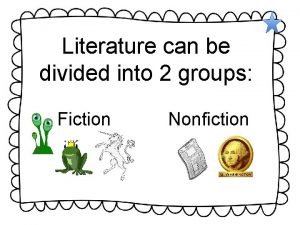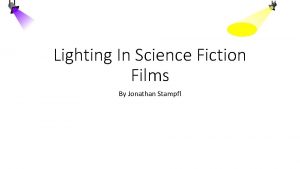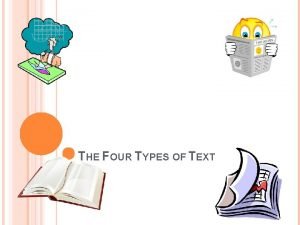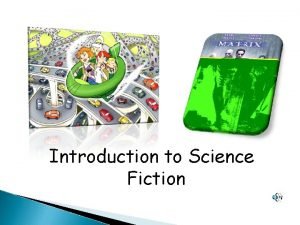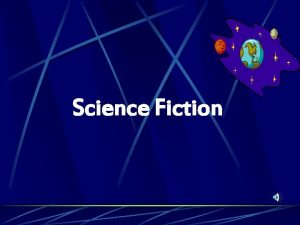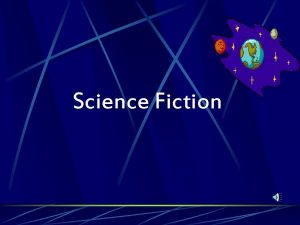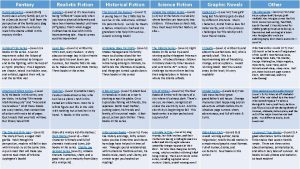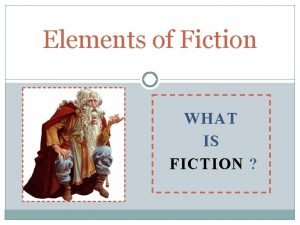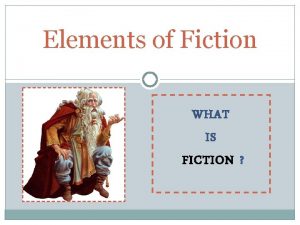Science Fiction WHAT IS SCIENCE FICTION Science fiction












- Slides: 12

Science Fiction

WHAT IS SCIENCE FICTION? • Science fiction is a writing style which combines science and fiction. • It is only limited by what we presently know about the basic physical laws of nature. • It evolved as a response to fantasy. • In Science Fiction, there needs to be some possibility that the events could possibly happen. • In Fantasy, the author can use far-fetched assumptions. ie; unicorns, three-legged creatures etc.

SCI FI AUTHOR’S DEFINITIONS The author Theodore Sturgeon said, "'A good science-fiction story is a story about human beings, with a human problem, and a human solution, which would not have happened at all without its science content'"

• The first true science fiction novel was Frankenstein by Mary Shelley. • She wrote about scientific practices and tried to persuade the reader that her story could actually happen. • Frankenstein was the first novel in English to deal with the possibility that science can create a monster that can destroy science, and possibly mankind. • Mary Shelley did not wish the story to be considered "supernatural“. She made the main character a scientist and his scientific efforts were highlighted.

WHAT IS EXTRAPOLATION? Extrapolation: is when a writer takes a known scientific fact and imagines what might happen if certain events or circumstances evolve. For example: 1. Man can build space shuttles. 2. Let’s imagine, man can travel to far-away planets.

MAJOR THEMES IN SCIENCE FICTION • Space travel to and from other planets (ie: Star Wars, Star Trek) • Time travel to the past and future (ie: Back to the Future) • Psychological/biological changes to man brought about by scientific changes (ie: The Incredible Hulk, Spider Man) • Science applied to human relations for constructive or destructive purposes (ie: Weird Science, Frankenstein) • Battle with alien life forms (ie: Signs, The Day the Earth Stood Still, District 9) • Alternate Universe (ie: Star Wars)

PLOT CONVENTIONS OF SCIENCE FICTION Examples of Story Ideas: • The Last Man/Woman on Earth • The Robot • The First Landing Story • Time Travel • The Alternate World • The Lost Civilization • The Alien Encounter • The Colonization of a New Planet • The End of the World • The Long Spaceship Voyage • The Computer • From the point of view of an alien


WHY SHOULD WE STUDY SCIENCE FICTION? • Entertaining • Makes the audience wonder “What If? ” • Encourages creativity in writing and role-playing • Introduces students to a new literary genre • Teaches lessons about the value and dangers of advanced technology • Enhances imagination

TOMORROW, TOMORROW • • • Written by a famous American science-fiction author, Kurt Vonnegut, Jr. The story deals with the issue of overpopulation. World population: • 1804 – 1 billion • 1927 – 2 billion • 1960 – 3 billion • 1974 – 4 billion In 2014, that number had risen exponentially to 7. 1 billion. The world’s population increases by 2. 3 people each second. All information on overpopulation has been adapted from World Population Day 2014: History, Facts and Risks of Overpopulation By Lydia Smith at http: //www. ibtimes. co. uk/world-population-day-2014 -history-facts-risks-overpopulation-please-publish-midnight-1456183

PROBLEMS CAUSED BY OVERPOPULATION • Lack of food – 25, 000 people die of malnutrition every day. 18, 000 of them are less than five-years old. • Lack of water – more than a billion people on the earth lack access to adequate water supplies. This affects consumption of water, cleanliness, and agriculture. • Oil and fossil fuels – these are non-renewable and limited resources and are being used up quickly • Air quality – more people means more cars and factories that pollute. • Ozone layer – Many industries release CFCs into the atmosphere, which destroy the protective ozone layer. It is decreasing by 4% every decade. • Overcrowding – too many people living in a small space can lead many problems, among them hygiene, violence, unemployment and air pollution. It is also easier for infectious diseased to spread. • Conflicts and wars – people fight and die for access to land, food, water, and oil.

The. The World Tomorrow World Today…
 The genre of speculative fiction
The genre of speculative fiction Contemporary realism literature
Contemporary realism literature Fiction and non fiction examples
Fiction and non fiction examples What is nonfiction
What is nonfiction Economics … my favorite subject at school
Economics … my favorite subject at school Science fiction lighting
Science fiction lighting Significant figures ap chemistry
Significant figures ap chemistry Characteristics of historical fiction
Characteristics of historical fiction Stranger things movie genre
Stranger things movie genre Types narrative text
Types narrative text Defintion fiction
Defintion fiction What is science fiction story
What is science fiction story Science fiction often uses nautical analogies
Science fiction often uses nautical analogies


